法律英语与法学专业教学
- 格式:docx
- 大小:37.54 KB
- 文档页数:2
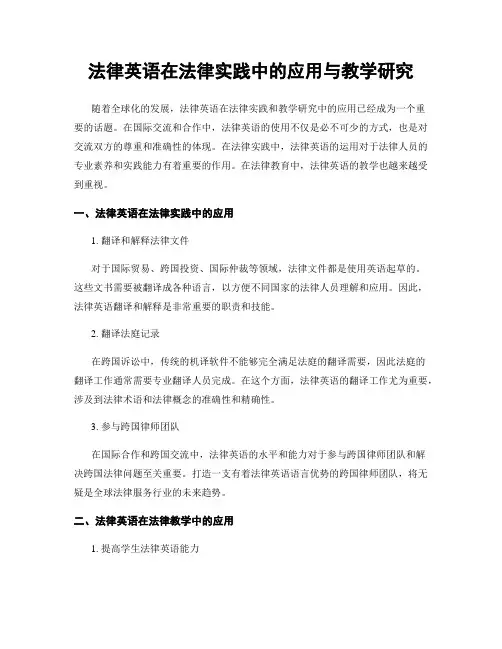
法律英语在法律实践中的应用与教学研究随着全球化的发展,法律英语在法律实践和教学研究中的应用已经成为一个重要的话题。
在国际交流和合作中,法律英语的使用不仅是必不可少的方式,也是对交流双方的尊重和准确性的体现。
在法律实践中,法律英语的运用对于法律人员的专业素养和实践能力有着重要的作用。
在法律教育中,法律英语的教学也越来越受到重视。
一、法律英语在法律实践中的应用1. 翻译和解释法律文件对于国际贸易、跨国投资、国际仲裁等领域,法律文件都是使用英语起草的。
这些文书需要被翻译成各种语言,以方便不同国家的法律人员理解和应用。
因此,法律英语翻译和解释是非常重要的职责和技能。
2. 翻译法庭记录在跨国诉讼中,传统的机译软件不能够完全满足法庭的翻译需要,因此法庭的翻译工作通常需要专业翻译人员完成。
在这个方面,法律英语的翻译工作尤为重要,涉及到法律术语和法律概念的准确性和精确性。
3. 参与跨国律师团队在国际合作和跨国交流中,法律英语的水平和能力对于参与跨国律师团队和解决跨国法律问题至关重要。
打造一支有着法律英语语言优势的跨国律师团队,将无疑是全球法律服务行业的未来趋势。
二、法律英语在法律教学中的应用1. 提高学生法律英语能力对于法律专业的学生而言,法律英语的能力和水平也是关注的重点。
在法律教育中,注重培养学生的法律英语能力将有助于提高他们在跨国领域中的竞争力。
2. 建立国际法律文化交流平台法律英语作为一种国际共通语言,可以利用这个优势建立国际化的法律文化交流平台。
在这个平台上,不同国家的法律专业人员可以共同探讨国际化的法律问题,分享各自的法律文化和实践经验,共同推动全球法律服务的发展。
3. 探索法律英语课程设计在法律英语教学中,注重课程设计是非常重要的。
在教学过程中,内容的丰富性、专业性和实用性都应该被充分考虑。
因此,教师需要针对学生的英语水平、法律背景和就业需求,制定出适合的法律英语课程,以提高学生的法律英语能力和竞争力。
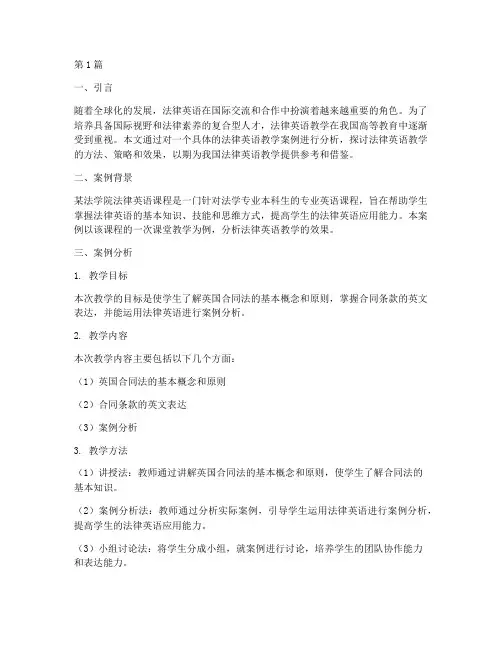
第1篇一、引言随着全球化的发展,法律英语在国际交流和合作中扮演着越来越重要的角色。
为了培养具备国际视野和法律素养的复合型人才,法律英语教学在我国高等教育中逐渐受到重视。
本文通过对一个具体的法律英语教学案例进行分析,探讨法律英语教学的方法、策略和效果,以期为我国法律英语教学提供参考和借鉴。
二、案例背景某法学院法律英语课程是一门针对法学专业本科生的专业英语课程,旨在帮助学生掌握法律英语的基本知识、技能和思维方式,提高学生的法律英语应用能力。
本案例以该课程的一次课堂教学为例,分析法律英语教学的效果。
三、案例分析1. 教学目标本次教学的目标是使学生了解英国合同法的基本概念和原则,掌握合同条款的英文表达,并能运用法律英语进行案例分析。
2. 教学内容本次教学内容主要包括以下几个方面:(1)英国合同法的基本概念和原则(2)合同条款的英文表达(3)案例分析3. 教学方法(1)讲授法:教师通过讲解英国合同法的基本概念和原则,使学生了解合同法的基本知识。
(2)案例分析法:教师通过分析实际案例,引导学生运用法律英语进行案例分析,提高学生的法律英语应用能力。
(3)小组讨论法:将学生分成小组,就案例进行讨论,培养学生的团队协作能力和表达能力。
4. 教学过程(1)导入:教师简要介绍英国合同法的基本概念和原则,激发学生的学习兴趣。
(2)讲解:教师详细讲解合同条款的英文表达,并举例说明。
(3)案例分析:教师选取一个具有代表性的合同案例,引导学生运用法律英语进行分析。
(4)小组讨论:将学生分成小组,就案例进行讨论,并要求各小组派代表进行汇报。
(5)总结:教师对学生的讨论进行总结,并对学生的表现给予评价。
5. 教学效果通过本次教学,学生掌握了英国合同法的基本概念和原则,熟悉了合同条款的英文表达,并能运用法律英语进行案例分析。
具体表现在以下几个方面:(1)学生的法律英语水平有所提高,能较好地阅读和理解法律英文文献。
(2)学生的法律思维和表达能力得到锻炼,能在实际工作中运用法律英语进行沟通和交流。
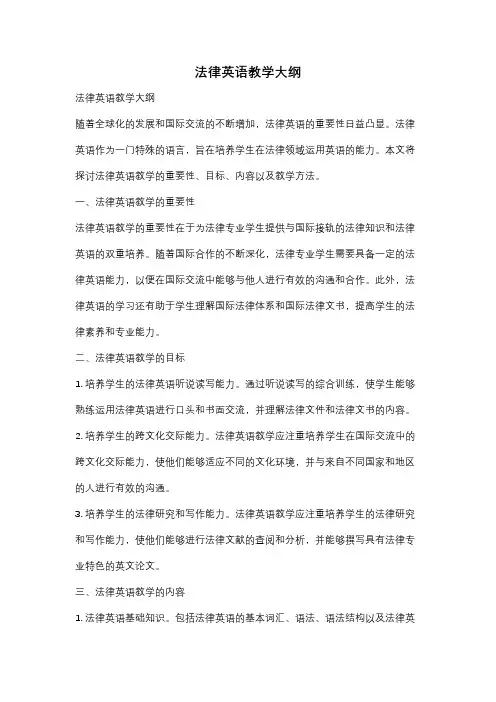
法律英语教学大纲法律英语教学大纲随着全球化的发展和国际交流的不断增加,法律英语的重要性日益凸显。
法律英语作为一门特殊的语言,旨在培养学生在法律领域运用英语的能力。
本文将探讨法律英语教学的重要性、目标、内容以及教学方法。
一、法律英语教学的重要性法律英语教学的重要性在于为法律专业学生提供与国际接轨的法律知识和法律英语的双重培养。
随着国际合作的不断深化,法律专业学生需要具备一定的法律英语能力,以便在国际交流中能够与他人进行有效的沟通和合作。
此外,法律英语的学习还有助于学生理解国际法律体系和国际法律文书,提高学生的法律素养和专业能力。
二、法律英语教学的目标1. 培养学生的法律英语听说读写能力。
通过听说读写的综合训练,使学生能够熟练运用法律英语进行口头和书面交流,并理解法律文件和法律文书的内容。
2. 培养学生的跨文化交际能力。
法律英语教学应注重培养学生在国际交流中的跨文化交际能力,使他们能够适应不同的文化环境,并与来自不同国家和地区的人进行有效的沟通。
3. 培养学生的法律研究和写作能力。
法律英语教学应注重培养学生的法律研究和写作能力,使他们能够进行法律文献的查阅和分析,并能够撰写具有法律专业特色的英文论文。
三、法律英语教学的内容1. 法律英语基础知识。
包括法律英语的基本词汇、语法、语法结构以及法律英语的特点和用法。
2. 法律英语听说能力培养。
通过听力训练和口语表达练习,提高学生的听说能力,使他们能够理解和运用法律英语进行口头交流。
3. 法律英语阅读能力培养。
通过阅读法律文献、案例和合同等法律文件,培养学生的阅读能力,使他们能够理解和分析法律英语的内容。
4. 法律英语写作能力培养。
通过写作训练,培养学生的法律写作能力,使他们能够撰写符合法律专业要求的英文论文和法律文书。
四、法律英语教学的方法1. 情景教学法。
通过模拟法庭辩论、案例分析等情景,使学生能够在真实的法律环境中运用法律英语进行交流和表达。
2. 多媒体教学法。
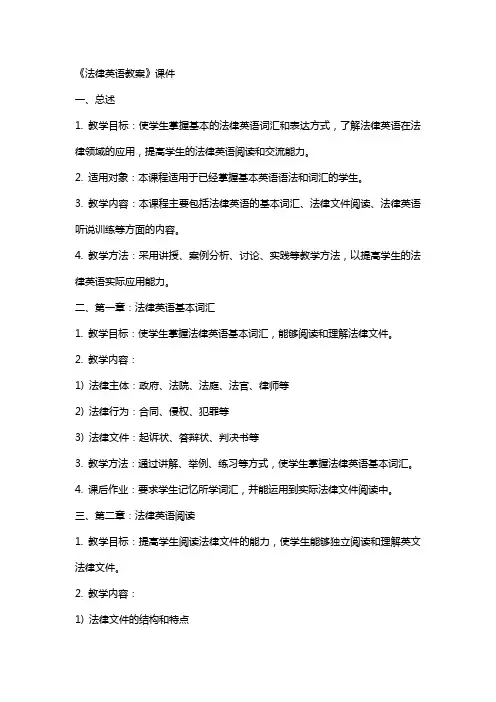
《法律英语教案》课件一、总述1. 教学目标:使学生掌握基本的法律英语词汇和表达方式,了解法律英语在法律领域的应用,提高学生的法律英语阅读和交流能力。
2. 适用对象:本课程适用于已经掌握基本英语语法和词汇的学生。
3. 教学内容:本课程主要包括法律英语的基本词汇、法律文件阅读、法律英语听说训练等方面的内容。
4. 教学方法:采用讲授、案例分析、讨论、实践等教学方法,以提高学生的法律英语实际应用能力。
二、第一章:法律英语基本词汇1. 教学目标:使学生掌握法律英语基本词汇,能够阅读和理解法律文件。
2. 教学内容:1) 法律主体:政府、法院、法庭、法官、律师等2) 法律行为:合同、侵权、犯罪等3) 法律文件:起诉状、答辩状、判决书等3. 教学方法:通过讲解、举例、练习等方式,使学生掌握法律英语基本词汇。
4. 课后作业:要求学生记忆所学词汇,并能运用到实际法律文件阅读中。
三、第二章:法律英语阅读1. 教学目标:提高学生阅读法律文件的能力,使学生能够独立阅读和理解英文法律文件。
2. 教学内容:1) 法律文件的结构和特点2) 法律条款的表述方式3) 案例分析:阅读和讨论英文法律案例3. 教学方法:采用案例分析法,引导学生通过阅读和法律逻辑推理,理解法律条款的含义。
4. 课后作业:要求学生阅读英文法律文件,并进行案例分析。
四、第三章:法律英语听说训练1. 教学目标:提高学生的法律英语听说能力,使学生能够熟练运用法律英语进行交流。
2. 教学内容:1) 法律英语口语表达方式2) 法律英语听力训练3) 模拟法庭:学生进行角色扮演,进行模拟法庭辩论3. 教学方法:采用模拟法庭、角色扮演等方法,进行法律英语听说训练。
4. 课后作业:要求学生进行法律英语口语练习,并进行模拟法庭辩论。
五、第四章:法律英语写作2. 教学内容:1) 法律英语写作的基本要求2) 法律文件起草和修改3) 案例分析:分析和讨论英文法律文件的写作技巧3. 教学方法:采用案例分析法,引导学生通过阅读和法律逻辑推理,掌握法律英语写作技巧。
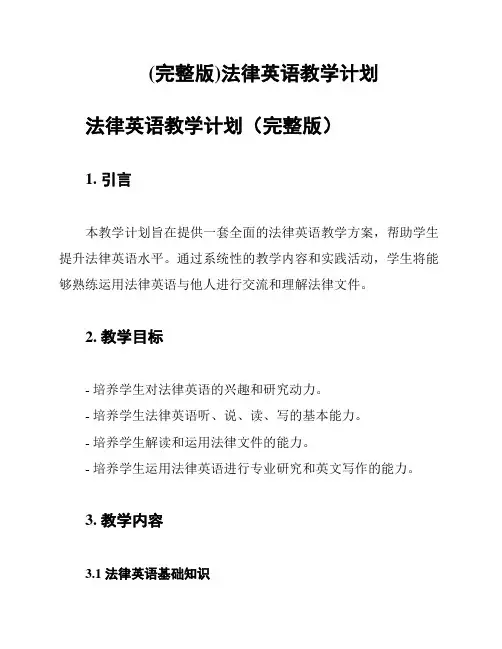
(完整版)法律英语教学计划法律英语教学计划(完整版)1. 引言本教学计划旨在提供一套全面的法律英语教学方案,帮助学生提升法律英语水平。
通过系统性的教学内容和实践活动,学生将能够熟练运用法律英语与他人进行交流和理解法律文件。
2. 教学目标- 培养学生对法律英语的兴趣和研究动力。
- 培养学生法律英语听、说、读、写的基本能力。
- 培养学生解读和运用法律文件的能力。
- 培养学生运用法律英语进行专业研究和英文写作的能力。
3. 教学内容3.1 法律英语基础知识- 英语法律词汇和常用表达。
- 法律英语的语法和语法结构。
- 法律英语的语音和发音规则。
3.2 口语和听力训练- 模拟法庭辩论和案件讨论。
- 听取法律演讲和庭审记录,并进行听力理解训练。
3.3 阅读和写作训练- 阅读法律文件、判决书和法规,并进行理解和分析。
- 撰写法律英语报告、论文和研究项目。
3.4 实践活动- 参观法庭、法律机构和法律英语培训中心。
- 参与模拟法庭活动和案例分析讨论。
4. 教学方法- 授课结合讲解和互动讨论,使学生积极参与。
- 使用案例分析和实践活动培养学生的实际运用能力。
- 配备多媒体教具和在线研究资源,提供丰富的研究素材。
5. 教学评估- 定期进行口语和听力测试,评估学生的口语表达和听力理解能力。
- 组织考试或项目作业,评估学生的阅读和写作水平。
- 参考学生的参与度和课堂表现,综合评估学生的综合能力。
6. 教学资源- 推荐教材:《法律英语教程》、《法学英语900句》等。
- 在线研究资源:法律英语研究网站、学术文献数据库等。
7. 教学时间安排本课程总计100个学时,每周3个学时,持续16周。
8. 教学团队本课程由经验丰富的法律英语专家和教师团队共同授课和辅导。
9. 教学成果评估与证书颁发- 学生须完成课程研究和考核方可获得结业证书。
- 优秀学生可获颁教学团队出具的优秀学员证书。
10. 总结本教学计划结合法律英语的基础知识、口语和听力训练、阅读和写作训练以及实践活动,全面培养学生的法律英语能力。
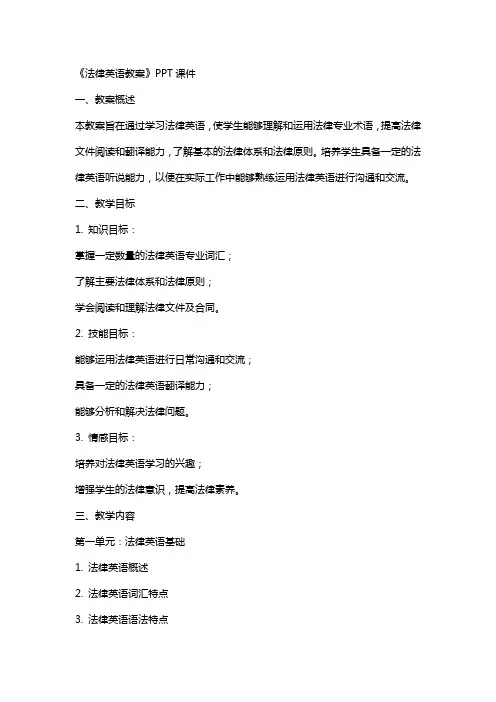
《法律英语教案》PPT课件一、教案概述本教案旨在通过学习法律英语,使学生能够理解和运用法律专业术语,提高法律文件阅读和翻译能力,了解基本的法律体系和法律原则。
培养学生具备一定的法律英语听说能力,以便在实际工作中能够熟练运用法律英语进行沟通和交流。
二、教学目标1. 知识目标:掌握一定数量的法律英语专业词汇;了解主要法律体系和法律原则;学会阅读和理解法律文件及合同。
2. 技能目标:能够运用法律英语进行日常沟通和交流;具备一定的法律英语翻译能力;能够分析和解决法律问题。
3. 情感目标:培养对法律英语学习的兴趣;增强学生的法律意识,提高法律素养。
三、教学内容第一单元:法律英语基础1. 法律英语概述2. 法律英语词汇特点3. 法律英语语法特点第二单元:法律体系与法律原则1. 主要法律体系简介2. 法律原则概述3. 法律原则在实践中的应用第三单元:法律文件与合同1. 法律文件的基本结构2. 法律文件常用条款3. 合同的订立与解除第四单元:法律诉讼程序1. 民事诉讼程序2. 刑事诉讼程序3. 行政诉讼程序第五单元:法律英语听说训练1. 法律英语日常用语2. 法律英语场景对话3. 法律英语听说技巧四、教学方法采用讲授法、案例分析法、情景模拟法、小组讨论法等相结合的教学方法,充分调动学生学习的积极性和主动性,提高学生法律英语实际运用能力。
五、教学评价1. 平时成绩:包括课堂参与、作业完成、小组讨论等,占总成绩的30%;2. 期中测试:包括词汇、语法、阅读理解、翻译等,占总成绩的30%;3. 期末考试:包括法律英语知识、实务操作、听说能力等,占总成绩的40%。
六、教学资源1. 教材:《法律英语教程》2. 辅助材料:法律案例、法律文献、法律英语词汇卡片3. 教学工具:PPT课件、投影仪、计算机、音响设备4. 网络资源:法律英语相关网站、论坛、在线词典七、教学安排1. 课时:48课时(每课时45分钟)2. 授课方式:每周两次课,每次课2课时3. 教学进度:按照教案安排进行,根据实际情况调整八、教学实践1. 法律英语角:组织学生进行法律英语角活动,让学生在实际交流中提高法律英语能力2. 法律英语竞赛:举办法律英语知识竞赛,激发学生学习兴趣,检验学生学习成果3. 法律案例分析:让学生分组分析真实法律案例,提高学生法律实务能力九、教学反思1. 定期对学生进行教学满意度调查,了解学生对教学方法的认可程度2. 及时收集学生反馈,针对问题调整教学方法和策略3. 加强师资培训,提高自身教学水平和能力十、教学总结1. 学期末组织学生进行法律英语知识测试,评估教学效果2. 总结教学经验,不断完善教学方法和手段3. 鼓励学生继续深入学习法律英语,为未来职业生涯奠定坚实基础重点和难点解析一、教案概述难点解析:确保教学目标符合学生的学习水平和期望,具备可操作性和可评估性。
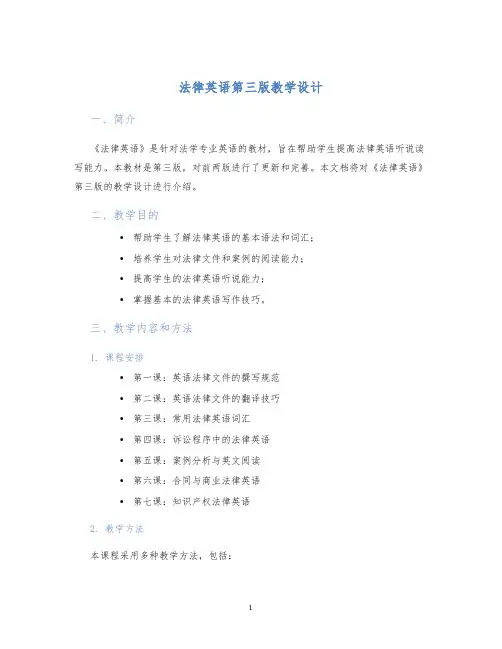
法律英语第三版教学设计一、简介《法律英语》是针对法学专业英语的教材,旨在帮助学生提高法律英语听说读写能力。
本教材是第三版,对前两版进行了更新和完善。
本文档将对《法律英语》第三版的教学设计进行介绍。
二、教学目的•帮助学生了解法律英语的基本语法和词汇;•培养学生对法律文件和案例的阅读能力;•提高学生的法律英语听说能力;•掌握基本的法律英语写作技巧。
三、教学内容和方法1. 课程安排•第一课:英语法律文件的撰写规范•第二课:英语法律文件的翻译技巧•第三课:常用法律英语词汇•第四课:诉讼程序中的法律英语•第五课:案例分析与英文阅读•第六课:合同与商业法律英语•第七课:知识产权法律英语2. 教学方法本课程采用多种教学方法,包括:•授课讲解:通过PPT等方式向学生介绍法律英语的基本知识、法律文件的撰写规范、法律文件的翻译技巧等;•分组讨论:将学生分为小组,让学生利用课堂时间进行案例研究和分析,提高学生的法律英语阅读和分析能力;•个人练习:课下布置英语写作和翻译习题,提高学生的法律英语写作技巧;•课后练习:布置课后习题,巩固英语记忆。
3. 教学材料•《法律英语》第三版教材;•PPT课件;•案例材料;•习题集。
四、教学评估•期中考试:考核学生对课程学习内容的掌握情况;•期末考试:考核学生对课程学习内容的应用情况;•作业成绩:考核学生对课堂讲解内容的理解和消化情况;•参与度和表现:考核学生在分组讨论、个人练习等环节中的表现。
五、教学反思通过对《法律英语》第三版课程的教学,可以发现学生对法律英语知识的掌握程度不同,有些学生对课堂内容反应迅速,有些学生需要更多的时间来理解。
因此,在课堂教学中,需要针对不同学生的能力、思维习惯等因素进行针对性的调整。
其次,在分组讨论和个人练习环节中,需要加强与学生的互动,及时发现学生存在的问题并做出相应的解答和点拨。
同时,需要不断更新教学内容和方法,紧跟法律英语的发展和前沿研究。
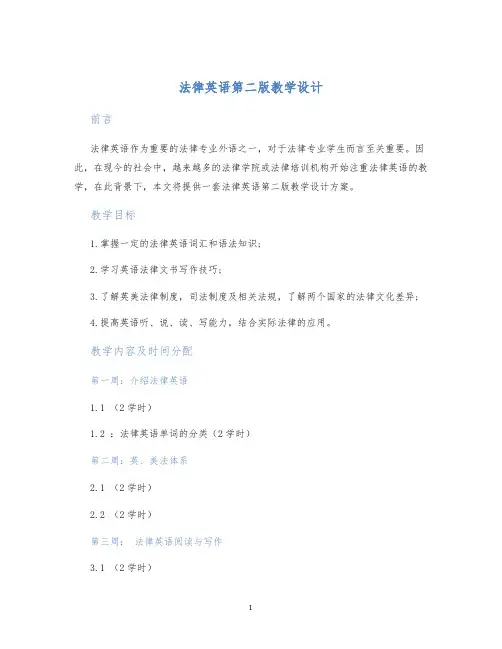
法律英语第二版教学设计前言法律英语作为重要的法律专业外语之一,对于法律专业学生而言至关重要。
因此,在现今的社会中,越来越多的法律学院或法律培训机构开始注重法律英语的教学,在此背景下,本文将提供一套法律英语第二版教学设计方案。
教学目标1.掌握一定的法律英语词汇和语法知识;2.学习英语法律文书写作技巧;3.了解英美法律制度,司法制度及相关法规,了解两个国家的法律文化差异;4.提高英语听、说、读、写能力,结合实际法律的应用。
教学内容及时间分配第一周:介绍法律英语1.1 (2学时)1.2 :法律英语单词的分类(2学时)第二周:英、美法体系2.1 (2学时)2.2 (2学时)第三周:法律英语阅读与写作3.1 (2学时)3.2 (2学时)第四周:法律英语口语4.1 (2学时)4.2 (2学时)第五周:法庭程序与证词5.1 (2学时)5.2 (2学时)第六周:讨论会与阅读6.1 (2学时)6.2 (2学时)教学方法本教学以网课为主,辅以线下工作坊和教师辅导,采用多媒体教学模式,配合实例案例和练习题,强调实践操作和互动交流。
评估方式本教学采用多种形式进行评测,包括作业、测验、讨论、小组项目等,并在期末进行综合评估。
教材与参考资料主要教材1.英语法律词汇大全2.英美法律制度对比分析3.美国法庭程序剖析4.法律文件写作技巧参考书目1.《英语法律写作案例精选》2.《法律英文:应用与实践》3.《美国法律制度》4.《基于实践的法律英语教学方法研究》总结通过本套教学设计方案,学生可掌握一定的法律英语词汇和语法知识,学习英语法律文书写作技巧,了解英美法律制度、司法制度及相关法规,同时提高英语听、说、读、写能力并结合实际法律应用。
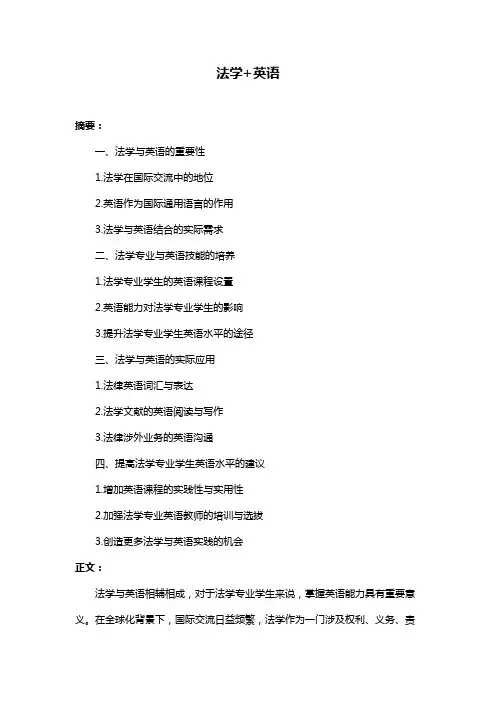
法学+英语摘要:一、法学与英语的重要性1.法学在国际交流中的地位2.英语作为国际通用语言的作用3.法学与英语结合的实际需求二、法学专业与英语技能的培养1.法学专业学生的英语课程设置2.英语能力对法学专业学生的影响3.提升法学专业学生英语水平的途径三、法学与英语的实际应用1.法律英语词汇与表达2.法学文献的英语阅读与写作3.法律涉外业务的英语沟通四、提高法学专业学生英语水平的建议1.增加英语课程的实践性与实用性2.加强法学专业英语教师的培训与选拔3.创造更多法学与英语实践的机会正文:法学与英语相辅相成,对于法学专业学生来说,掌握英语能力具有重要意义。
在全球化背景下,国际交流日益频繁,法学作为一门涉及权利、义务、责任等方面的学科,其在国际间的交流与合作不可或缺。
英语作为国际通用语言,在法学领域的应用日益广泛,使得法学与英语的结合显得尤为重要。
我国法学专业学生在学习过程中,英语课程的设置为其打下了良好的英语基础。
然而,英语能力对法学专业学生的影响深远,涉及到学术研究、职业发展等多方面。
因此,法学专业学生需要通过各种途径提升自己的英语水平,例如参加英语角、参加英语辩论赛、加入英语学习小组等。
在实际应用中,法学与英语的结合体现在法律英语词汇与表达、法学文献的英语阅读与写作以及法律涉外业务的英语沟通等方面。
掌握丰富的法律英语词汇和表达,能帮助法学专业学生更好地理解法律条款,提高法学文献阅读与写作能力。
此外,在法律涉外业务中,良好的英语沟通能力对于法学专业学生而言尤为重要。
为了提高法学专业学生的英语水平,教育部门可以采取一系列措施。
例如,增加英语课程的实践性与实用性,使学生在实际应用中提高英语能力;加强法学专业英语教师的培训与选拔,提高教学质量;创造更多法学与英语实践的机会,如开展法学英语角、组织法学英语辩论赛等。
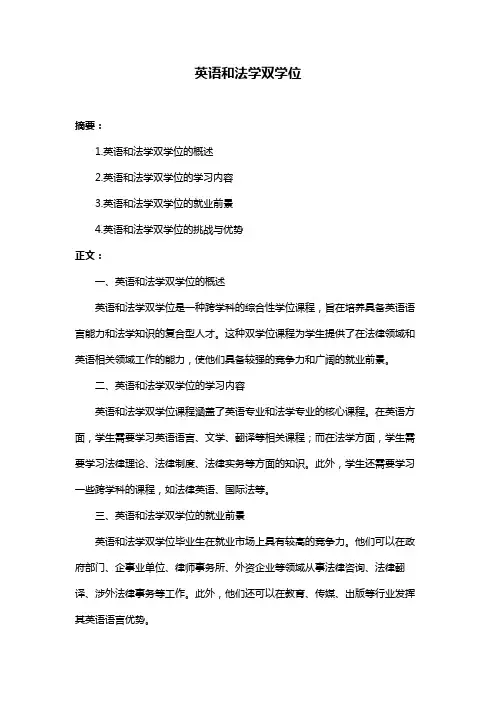
英语和法学双学位
摘要:
1.英语和法学双学位的概述
2.英语和法学双学位的学习内容
3.英语和法学双学位的就业前景
4.英语和法学双学位的挑战与优势
正文:
一、英语和法学双学位的概述
英语和法学双学位是一种跨学科的综合性学位课程,旨在培养具备英语语言能力和法学知识的复合型人才。
这种双学位课程为学生提供了在法律领域和英语相关领域工作的能力,使他们具备较强的竞争力和广阔的就业前景。
二、英语和法学双学位的学习内容
英语和法学双学位课程涵盖了英语专业和法学专业的核心课程。
在英语方面,学生需要学习英语语言、文学、翻译等相关课程;而在法学方面,学生需要学习法律理论、法律制度、法律实务等方面的知识。
此外,学生还需要学习一些跨学科的课程,如法律英语、国际法等。
三、英语和法学双学位的就业前景
英语和法学双学位毕业生在就业市场上具有较高的竞争力。
他们可以在政府部门、企事业单位、律师事务所、外资企业等领域从事法律咨询、法律翻译、涉外法律事务等工作。
此外,他们还可以在教育、传媒、出版等行业发挥其英语语言优势。
四、英语和法学双学位的挑战与优势
英语和法学双学位课程的挑战在于学生需要掌握两个专业的知识,学习压力较大。
然而,这种双学位课程的优势也十分明显,它使学生具备较强的跨领域能力,拓宽了职业发展道路。
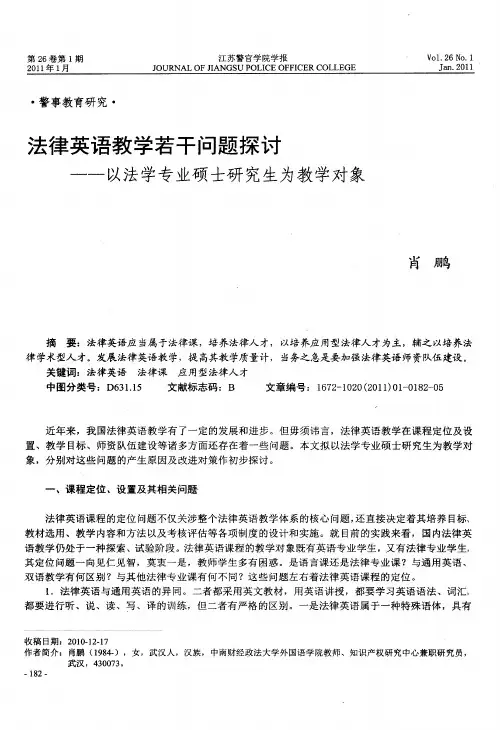
中国海洋大学本科生课程大纲课程属性:公共基础/通识教育/学科基础/专业知识/工作技能,课程性质:必修、选修一、课程介绍1.课程描述:《法律英语》是法学专业的一门选修课,它以英美法系的法律知识为核心教学内容,包括英语法律术语、英美法系与大陆法系的比较、英美律师职业介绍、英美主要部门法、WTO 法律文件选读、国际经贸法律、法学研究技巧与资源的运用。
As a selective course of law major, the Legal English provides knowledge on legal systems of common law, including the basic legal terms, the comparison between common law family and continental law family, legal career introduction, civil and criminal law, WTO rules and international business clauses. It also trains students with legal research and writing abilities.2.设计思路:(1)浸入式学习为主。
通过指导学生阅读一些精选的法律类英语文章和法律法规,使学生掌握英美法系的基本概念、基本理论以及专业术语。
(2)词汇与形式并重。
在教学过程中,一方面着重扩大学生的专业词汇量,提高学生的法律英语阅读理解水平;另一方面介绍英美法律文书的主要格式,使学生熟悉英文法律文书的内容和形式,具备收集资料、查阅文书和文献的基本能力。
- 2 -(3)课堂讲授与学生互动结合。
本课程采用个人发言和小组讨论等多种形式以增加学生的语言实践机会,使他们能将专业知识与英语知识很好地结合,最终具有较强的英语口头交流能力和翻译能力。
《法律专业外语》课程教学大纲一、《法律专业外语》课程说明(一)课程代码:02130016(二)课程英文名称:Legal English(三)开课对象:法学专业(四)课程性质:本课程是法学专业必选学科选修课程之一,一般在大学三年级开设。
法学专业本科学生通过两年的大学英语的学习,已掌握了普通英语的基本语汇、语汇和句型,为法律专业英语的学习打下了良好的基础。
法律专业英语课程的开设一方面为学生继续学习英语提供了良好的机会,另一方面也能使学生运用英语来表达自己所学的法律专业知识,从而为他们将来直接运用英语获得本专业的最新信息奠定基础。
其前导课程有综合英语、基本法律课程等。
在课程类别中属于专业教育课程、专业必修课。
(五)教学目的:通过这门课的教学与学习,将使学生了解和掌握法律英语的阅读与写作方法,并从众多节选于国外名著名篇中的课文里,了解国外尤其是英美法系国家里的法律制度,并培养学生运用已学的英语知识和相关法律原理来分析、处理和解决实际案例的能力。
(六)教学内容:本课程要求学生,首先必须熟知相关的法律知识,即英美法律制度,然后通过教师对某些课文的讲解和学生自身根据教师提问对某些课文的阅读,掌握相关法律词汇,包括法律英语中基本词汇,以及学生已熟悉,但在法律语境下,与日常用义大相径庭的词汇;掌握法律英语中长句的理解和翻译,从而熟悉和掌握法律英语的特点。
(七)学时数、学分数及学时数具体分配学时数: 48学时分数: 3学分(八)教学方式教学方式以课堂教学为主。
(九)考核方式和成绩记载说明考核方式为考查。
严格考核学生出勤情况,达到学籍管理规定的旷课量取消考试资格。
综合成绩根据平时成绩和期末成绩评定,平时成绩占40% ,期末成绩占60% 。
二、讲授大纲与各章的基本要求Lesson One:Legal System法律制度教学要点:Pre-reading tasks1.What legal systems do you know about? Can you say something about them?2.What is Russia’s legal system? And The Scandinavian countries’?Comprehension of the text: Answer the following questions1.How did civil-law system come into being?2.What countries does the civil-law family have influence on?3.What counties does the common law system have influence on?4.What is the characteristic of the civil-law family?5.What is the doctrine of common law?6.Does the development of a country have a close relationship with the country’s law?What is the difference between the civil-law family and the common law system?教学时数:2 学时教学内容:Legal systemsClusters/families/groups of legal systemsCivil-law familyCommon law systemlaw schools accredited by the American Bar Association. Most states do not accept bar applications from graduates of law schools not on that list.In the first year of law school students generally are required to take broad introductory topics. These may include torts, contracts, criminal law, civil procedure, property, and constitutional law. Many schools also require courses in legal writing and legal research.The second and third years of law school allow a student to concentrate on particular areas of the law such as business, litigation, international, or family law. A number of courses may still be recommend or required such as federal income taxation, corporations, commercial law, and professional ethics. In addition, the second and third years often provide the student with the chance to get some legal experience through legal aid clinics and internships.Law students usually participate in extra-curricular activities that provide them with further useful experience. Law reviews are legal academic journals edited and in part written by students. Membership in law review is usually granted on the basis of first year grades or a writing competition. Moot Court provides students with the opportunity to compete with one another by giving mock oral arguments before a panel of judges.Law school teaching tends to be far more interactive than is common in undergraduate education, despite large classes. In the classic "Socratic Method" the law professor asks a student a series of questions about assigned cases.教学时数:2 学时教学内容:Part one: Curriculum and the case methodPart two: Law school hierarchy考核要求:Which teaching method is better forlaw study:case method or lecture method?Lesson Four:Judicial System司法系统教学要点:1st period pre-reading activities (familiar with new words, terms, and background information)2nd period while reading (highlights of the text)3th period after-reading activities教学时数:2 学时教学内容:Part one:Courts--the Supreme Court--Court of Appeals--District CourtPart two:Judges--Justice--Judge--Justice of Peace/Magistrate考核要求:1.How many court systems are there in the United States? And what are they?2.How many judges generally are there in a federal district court?3.How are state court judges usually selected?Lesson Five:Constitution宪法教学要点:Warming-up questions1. How much do you know about English constitution?2. Can you guess what the theme of this unit refers to?3. Can you say something about the organ of the English government?Comprehension of the text.1. What is the form of government based on in Britain?2. According to the text, which of the following does not hold power?3. Which of the following causes a new election of the Cabinet?4. Where are the policies of the government warmly discussed and closely watched?5. How often is the election for seats in Commons held?教学时数: 2 学时教学内容:ConstitutionUnwritten constitutionSovereignMonarchExecutive branchCabinetHouse of CommonsHouse of Lords考核要求:Students will be able to:1.understand the main idea (the function of each organ of the government and their relationship in England)of the text;2. master some related legal terms; understand how the government work3. conduct a series of reading, listening, speaking and writing activities related to the theme of the unit.Lesson Six:Administrative Law行政法教学要点:Administrative law encompasses laws and legal principles governing the administration and regulation of government agencies (both Federal and state).Generally, administrative agencies are created to protect a public interest rather than to vindicate private rights.教学时数:2 学时教学内容:Administrative lawAgency actionAdministrative unitAdjudicationRulemakingdiscretionary考核要求:1.What is the scope of administrative law?2.What is agency action?3.What is interpretation in administrative law?4.What are the central tasks of administrative law?Lesson Seven:Criminal Law刑法教学要点:Students will be able to:1. understand the main idea (the general knowledge of crimes and punishment) of thetext;2. master some related legal terms;3. conduct a series of reading, listening, speaking and writing activitiesrelated to the theme of the unit.4. try to understand the criminal procedure教学时数:4 学时教学内容:Justice1. the ideal of fair and beneficent treatment of all people by each other and by their governments, which law in a democratic society attempts to serve2. the system of law and administration of lawCriminal justiceJustice of the peaceFraudStatuteCodeSelf-defenseMisdemeanor--a crime less serious than a felony, usually one punishable by incarceration for up to one year, in some states misdemeanors include some offenses punishable only by a fine考核要求:1. Comprehension of the text.1) Which aspect of law are ordinary people most familiar with?2) What kind of criminal conduct can be found in a federal government code?3) In which country was it illegal to own gold in the past?2. VocabularyCompare and contrast the following pair of wordscrime/criminal vary/variable threat/threaten violate/violationburglar/burglary3. GrammarLesson Eight:Civil Rights Law民权法教学要点:A civil right is an enforceable right or privilege, which if interfered with by another gives rise to an action for injury. Examples of civil rights are freedom of speech, press, assembly, the right to vote, freedom from involuntary servitude, and the right to equality in public places. Discrimination occurs when the civil rights of an individual are denied or interfered with because of their membership in a particular group or class. Statutes have been enacted to prevent discrimination based on a persons race, sex, religion, age, previous condition of servitude, physical limitation, national origin and in some instances sexual preference.教学时数:2 学时教学内容:The most important expansion of civil rights in the United States was the enactment of the Thirteenth and Fourteenth Amendments.The most prominent civil rights legislation since reconstruction is the Civil Rights Act of 1964.The judiciary, most notably the Supreme Court, plays a crucial role in interpreting the extent of the civil rights.The existence of civil rights and liberties are recognized internationally by numerous agreements and declarations.International Covenant on Civil and Political Rights.考核要求:1.What is the common form of racial discrimination in the workplace?2.What is the Walker v. IRS about?Lesson Nine:Contract Law合同法教学要点:Students will be able to:1. understand what makes a valid contract;2. master some related legal terms;3. conduct a series of reading, listening, speaking and writing activities related to the themeof the unit.教学时数:4 学时教学内容:In legal terms, a contract is:1.A promise (or set of promises) that the law protects and enforces. e.g.2.seller: promise to deliver a carload of lumber3.buyer: promises to pay the seller a certain price4.If one party breached the contract, the other party can choose to sue.A valid contract“offer” and “acceptance” are promises and must be supported by “consideration”,which is: --a mysterious substance,--an intricate legal concept--underlying idea: each party makes his promise “in consideration” of something the other party promises.--e.g. I offer to sell my old car for $2,000, the buyer accepts (promising to pay $2,000) --- consideration on each side is clear.--e.g. I promise to give my daughter a handful of diamonds --- there is no “consideration” for my promise.考核要求:Pre-reading tasks1.What is a contract?2.What can people do with contracts?After-reading activitiesComprehension of the text: Answer the following questions1.How to understand “from status to contract”?2.What is a contract in legal terms?3.What are the factors in a valid contract?4.What is consideration?5.Why do businessmen tend to sidestep contract law in the world of affairs?6.What is the relationship between contract law and commercial law?Lesson Ten:Tort Law侵权法教学要点:Students will be able to:1.understand the main idea (the knowledge of tort law)of the text;2.master some related legal terms;3. conduct a series of reading, listening, speaking and writing activitiesrelated to the theme of the unit.教学时数: 2 学时教学内容:TortTortfeasorWrongFellow servant rule/doctrineNegligenceRecoverReasonable man/personStrict liability考核要求:Pre-reading tasks1. How much do you know about Torts law?2. What can be covered in torts law?After-reading activitiesComprehension of the text.1.What is the common characteristic of the behaviors defined as civil wrongs?2. Which category of civil wrongs has not grown rapidly in the 20th century?3. As for the product liability, to whom the court judgments are favorable in the 20th century?4. According to the text, what is the fundamental concept of tort law?Lesson Eleven:Property Law财产法教学要点:Property signifies dominion or right of use, control, and disposition which one may lawfully exercise over things, objects, or land. One of the basic dividing lines between property is that between real property and personal property. Generally, the term real property refers to land. Land, in its general usage, includes not only the face of the earth but everything of a permanent nature over or under it. This includes structures and minerals.教学时数:2 学时教学内容:There are further divisions within the real property classification. The most important are freehold estates, nonfreehold estates, and concurrent estates. (Others are future interests, specialty estates, and incorporeal interests).---Freehold estates are those in which an individual has ownership for an indefinite period of time. An example of a freehold estate is the "fee simple absolute", which is inheritable and lasts as long as the individual and his heirs wants to keep it. Another example is the "life estate", in which the individual retains possession of the land for the duration of his or her life.---Nonfreehold estates are property interests of limited duration. They include tenancy for years, tenancy at will, and tenancy at sufferance.---Concurrent estates exist when property is owned or possessed by two or more individuals simultaneously考核要求:1.What are the roles of government in the field of property law?2.What are the lawyers in the field of property law?3.What are the major areas in real property law?Lesson Twelve:Corporation Law公司法教学要点:A corporation is a legal entity created through the laws of its state of incorporation. Individual states have the power to promulgate laws relating to the creation, organization and dissolution of corporations. The law treats a corporation as a legal "person" that has standing to sue and be sued, distinct from its stockholders. The legal independence of a corporation prevents shareholders from being personally liable for corporate debts. It also allows stockholders to sue the corporation through a derivative suit and makes ownership in the company (shares) easily transferable. The legal "person" status of corporations gives the business perpetual life; deaths of officials or stockholders do not alter the corporation's structure.教学时数:2 学时教学内容:Corporation LawPart one: IntroductionPart two: Forms of businessA.ProprietorshipsB.PartnershipsC.Corporations考核要求:1.What are the main classes of business enterprises in the United States?2.What are the main categories of laws applicable to business enterprises in the United States?3.What are Blue Sky Laws?Lesson Thirteen:Insurance Law保险法教学要点:In the absence of insurance, three possible individuals bear the burden of an economic loss; the individual suffering the loss; the individual causing the loss via negligence or unlawful conduct; or lastly, a particular party who has been allocated the burden by the legislature, such as employers under Workmen's Compensation statutes. While types of insurance vary widely, their primary goal is to allocate the risks of a loss from the individual to a great number of people.教学时数:2 学时教学内容:In general, insurance companies are the safekeepers of the premiums. Because of its importance in maintaining economic stability, the government and the courts use a heavy hand in ensuring these companies are regulated and fair to the consumer.Each individual pays a "premium" into a pool, from which losses are paid out. Regardless of whether the particular individual suffers the loss or not the premium is not returnable.Up until 1944, insurance was not considered "commerce" and not subject to federal regulation. But in United States v. South-Eastern Underwriters Association, the Supreme Court held that Congress could regulate insurance transactions that were truly interstate.考核要求:1.Why do people purchase group insurance for personal needs?2.What are the important of insurance for business?3.What is “key man ” insurance?Lesson Fourteen:Commercial Law商法教学要点:Commercial law governs the broad areas of business, commerce, and consumer transactions. Specific law has developed in a number of commercial fields. The Uniform Commercial Code, which has been substantially adopted as statutory law in nearly every state, governs numerous areas of commercial law.教学时数:2 学时教学内容:Banks and bank accounts are regulated by both state and federal statutory law. Bank accounts may be established by national and state chartered banks and savings associations. All are regulated by the law under which they were established.Bankruptcy law provides for the development of a plan that allows a debtor, who is unable to pay his creditors, to resolve his debts through the division of his assets among his creditors.Credit allows consumers to finance transactions without having to pay the full cost of the merchandise at the time of the transaction.Negotiable instruments are mainly governed by state statutory law.Real estate transactions are governed by a wide body of federal statutes and state statutory and common law.考核要求:1.What is the history of the commerce clause adjudication?2.What does the Supreme Court interpret the commerce clause?Lesson Fifteen:Tax Law税法教学要点:The focus of this lesson is on tax and related issues. Tax includes income(corporate and personal), excise and other taxation devices. Commercial law, trade,intellectual property, etc. deal with the transactions giving rise to tax. Businessorganizations focuses upon the entities themselves.教学时数: 2 学时教学内容:Part one:Federal taxation1.Introduction2.Generalscope of the taxing power3.Direct v. indirect taxes4.Federal taxing and due process5.Federal taxes as regulatory measuresPart two:State taxation1.Death taxes2.Income taxes考核要求:1.What are the two limitations upon the exercise of Congress’ taxation power?2.What are the principles of due process with respect to jurisdiction to impose income taxesupon individuals and corporations in the United States?Lesson Sixteen:Environmental Law环境保护法教学要点:The National Environmental Policy Act (NEPA) was passed in 1970 along with the Environmental Quality Improvement Act, the Environmental Education Act, and the Environmental Protection Agency (EPA). The main objective of these federal enactments was to assure that the environment be protected against both public and private actions that failed to take account of costs or harms inflicted on the eco-system.The EPA was supposed to monitor and analyze the environment, conduct research, and work closely with state and local governments to devise pollution control policies. NEPA (really enacted in 1969) has been described as one of Congress's most far reaching environmental legislation ever passed. The basic purpose of NEPA is to force governmental agencies to consider the effects on the environment of their decisions.State laws also reflect the same concerns and common law actions in nuisance allow adversely affected property owners to seek a judicial remedy for environtal harms harms.教学时数:2 学时教学内容:Part one: National environmental policy act(Enacted in 1970;Amended in 1975)Title one DECLARATION OF NATIONAL ENVIRONMENTAL POLICY Part two :Federal actions to address environmental justice in minority populations and low-income populations(Executive order 12898,1994)考核要求:1.Why did the Congress make the Declaration of National Environmental Policy?2.What is the continuing policy of the Federal Government?3.What are main contents of an environmental impact statement?Lesson Seventeen:Family Law家庭法教学要点:The right to freedom of choice in marriage and family relationships lies at the heart of the right to privacy. Family relationships, by their nature involve deep attachments and commitments to the necessarily few other individuals with whom one shares not only a special community of thoughts, experiences, and beliefs but also distinctly personal aspects of one’s life.教学时数: 2 学时教学内容:Domestic relations law--Marriage-husband-wife relation--divorce--separation--parent-child relation--adoption--custody--support考核要求:1.Should Abortion Be Legal?2.What is the relationship between the right to privacy and the right to freedom ofchoice in marriage and family relationships?Lesson Eighteen:Intellectual Property Law知识产权法教学要点:Pre-reading tasks1.What is copyright?2.What rights does Copyright Law protect?3.How can an owner get protected by Copyright Law?Comprehension of the text: Answer the following questions1.What rights does Copyright Law protect?2.What is a prescribed copyright notice made up of?3.How can an owner get protected by Copyright Law?4.What remedies may a copyright owner have if infringement is proved?5.As to the exception to the copyright infringement, what activities are in the realm of fairuse?6.What has been done to protect the copyright owners in the world?教学时数:2 学时教学内容:CopyrightCopyright can be sold or licensed to othersFormalities requirement under U.S. lawUCC (the Universal Copyright Convention)To secure copyright protection in the USA and UCC member nationsOther international conventions考核要求:Students will be able to:1. understand what makes a valid contract;2. master some related legal terms;3. conduct a series of reading, listening, speaking and writing activities related to the themeof the unit.Lesson Nineteen:Civil Procedure民事诉讼程序教学要点:Broadly speaking, civil procedure consists of the rules by which courts conduct civil trials. "Civil trials" concern the judicial resolution of claims by one individual or group against another and is to be distinguished from "criminal trials", in which the state prosecutes an individual for violation of criminal law."Procedure" is to be distinguished from "substantive law" in that substantive law defines the rights and duties of everyday conduct. Substantive law includes contract law, tort law, and so on.In America, civil procedure usually takes the form of a series of rules and judicial practices. The federal courts follow the Federal Rules of Civil Procedure; the state courts follow their own state rules of civil procedure.In federal courts, evidentiary rules are governed by the Federal Rules of Evidence.The state courts follow their own state rules of evidence.教学时数: 2 学时教学内容:adersary systemjury systemFederal Rule of Civil ProcedureJury Trial1.In general2.Scope of jury rights3.Means of controlling the jury考核要求:1.What were the there types of courts in the English legal history?2.What are the distinctive characteristics of the adversary trial system?3.Writing a legal memorandumLesson Twenty:Criminal Procedure刑事诉讼程序教学要点:The rules of criminal procedure are different from those of civil procedure, because the two areas (criminal and civil) have different objectives and results. In criminal cases, the state brings the suit and must show guilt beyond a reasonable doubt, while in civil cases the plaintiff brings the suit and must only show the defendant is liable by a preponderance of the evidence.The American criminal system is an adversarial and accusatorial model. Criminal procedure must balance the defendant's rights and the state's interests in a speedy and efficient trial with the desire for justice. Therefore, the rules of criminal procedure are designed to ensure that a defendant's rights are protected.教学时数: 2 学时教学内容:Part one : the adversary systemPart two: the accusatorial systemThe burden of proofThe burden of going forward with the evidencePresumption of innocencePart three: standards of proof考核要求:1.How does an adversary system arrive at a decision?2.What is an inquisitorial system?3.How many standards of proof are critical legal standards and what are they?4.What is the key to an accusatorial process of proof?Lesson Twenty One:Rules of Evidence证据规则教学要点:There are two principal questions about evidence that have to be answered.First, what matters and what materials should be admitted into evidence for the jury to consider?Secondly, what use can properly be made by the jurors of those matters and materials that are ruled admissible?教学时数: 2 学时教学内容:Rules of evidence: Admissibility; Relevancy;Weight;Sufficiency;Burden of proofTypes of evidence : direct evidence; indirect evidenceForms of evidence--Testimonial evidence--Tangible evidence--Judicial notice考核要求:1.What do the rules of evidence apply to?2.What is ‘RELEV ANT EVIDENCE”?3.What evidence is not admissible?4.What are the court direct a party to predicate error upon a ruling?Lesson Twenty Two:WTO Rules世贸组织规则教学要点:The WTO’s procedure for resolving trade quarrels under the Dispute Settlement Understanding is vital for enforcing the rules and therefore for ensuring that trade flows smoothly.A dispute arises when a member government believes another member government is violating an agreement or a commitment that it has made in the WTO. The authors of these agreements are the member governments themselves —the agreements are the outcome of negotiations among members. Ultimate responsibility for settling disputes also lies with member governments, through the Dispute Settlement Body.教学时数: 2 学时教学内容:A unique contributionDispute settlement is the central pillar of the multilateral trading system, and the WTO’s unique contribution to the stability of the global economy. Without a means of settling disputes, the rules-based system would be less effective because the rules could not be enforced. The WTO’s procedure underscores the rule of law, and it makes the trading system more secure and predictable. The system is based on clearly-defined rules, with timetables for completing a case. First rulings are made by a panel and endorsed (or rejected) by the WTO’s full membership. Appeals based on points of law are possible.---Principles: equitable, fast, effective, mutually acceptable---First stage: consultation (up to 60 days).--- Second stage: the panel (up to 45 days for a panel to be appointed, plus 6 months for the panel to conclude).---Appeals考核要求:1.How are disputes settled?2.What is DSU?3.What is DSB?三、推荐教材和参考书目1.《法律英语》,何家弘,第二版,法律出版社,20042.《法律英语教程》,沙丽金、林萍,中国政法大学出版社,20003.《法律英语》,董世忠、赵建,复旦大学出版社,19974.《法律英语核心教程》,杜金榜、张新红,对外经济贸易大学出版社,2002执笔人:申静审核人:张道功审定:法学院。
法律英语与法学专业教学
在当今全球化的时代,法律英语不仅是法学专业学生必备的外语技能,也逐渐
成为法学专业教学中不可或缺的一部分。
与此同时,法学专业教学也需要不断与实际需要相结合,为学生提供更加灵活和全面的知识体系。
因此,本文将探讨法律英语与法学专业教学的关系以及它们之间的交互作用。
首先,法律英语作为一门专门的学科,它独立于法学专业的学科体系,但却与
法学密切相关。
它不仅包含了法律词汇、法律文书的理解与翻译等基础知识,还包括了法律实务、国际法等深入的专业内容。
对于法学专业的学生来说,通过学习法律英语,他们可以更好地理解和应用法律知识,提高专业素养和工作能力。
同时,法律英语也可以帮助法学专业的学生拓宽国际视野,了解国际法律规则和国际社会发展动态,从而使他们在国际事务和跨国企业等领域具备竞争力。
其次,法学专业教学应当包括对法律英语的教学内容,以满足学生的需求和社
会的发展。
在法学专业的课程设置中,应加强对法律英语的学习安排,例如增加专门的法律英语课程,将法学与英语两个专业有机地结合起来。
在这样的教学模式下,学生不仅可以获得法学领域的专业知识,还可以在学习英语的过程中提升法律英语的应用能力。
此外,还可以通过设置案例分析、合同撰写等实践性环节,培养学生的实际操作能力。
然而,教学过程中应避免简单地将法律英语作为一门语言课程来教授,而应将
其与法学理论相结合来进行深入的教学。
应通过具体案例和实际问题的分析,引导学生掌握法律英语中的法律概念和理论,以及判断和解决问题的能力。
这样的教学模式可以使学生在将来的实际工作中能够运用所学知识解决实际问题,并具备较强的实践能力。
除了课堂教学之外,还应鼓励学生积极参与学术研究和实践项目。
他们可以通
过参与模拟法庭辩论、国际学术交流等活动,不仅提升法律英语水平,而且还可以
提高学生的法学思维能力、组织能力和表达能力。
同时,还可以鼓励学生参与社会实践,并将实践经验与法学理论相结合,为社会提供解决实际问题的方案。
在教学效果的评估方面,应建立多元化的评价体系。
除了传统的考试和论文写
作之外,还可以加入写作比赛、模拟法庭辩论等形式,以更全面、客观的方式评估学生的学习成果。
此外,由于法学专业和法律英语的学习需要长期的积累和实践,教学过程应设立评定学生实际操作能力的环节,例如实习和毕业论文的撰写等。
综上所述,法律英语与法学专业教学之间存在着密切的联系与相互促进的关系。
法律英语不仅是法学专业学生必备的外语技能,也是他们提升专业素养和国际竞争力的重要手段。
通过将法律英语与法学理论结合进行教学,可以培养学生的实践能力和综合素质,并为他们今后的职业生涯做好充分准备。
因此,深化法律英语的教学内容与方法,与时俱进,将有助于培养出更加全面和优秀的法学专业人才。